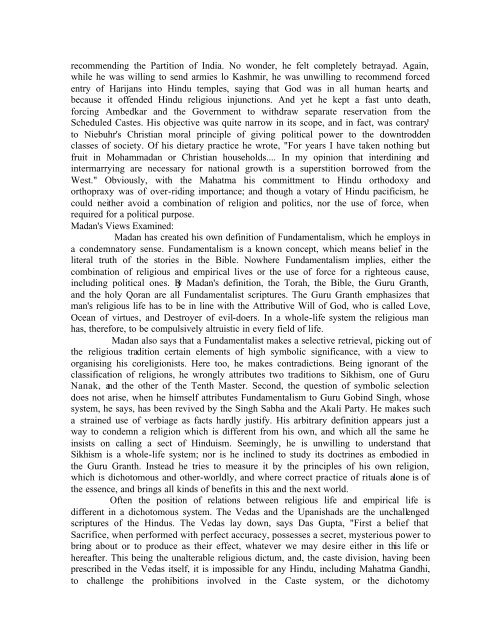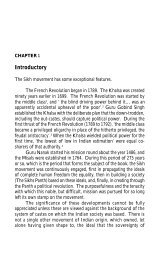Fundamentalism and the Sikh Religious Tradition by T.N. Madan
Fundamentalism and the Sikh Religious Tradition by T.N. Madan
Fundamentalism and the Sikh Religious Tradition by T.N. Madan
Create successful ePaper yourself
Turn your PDF publications into a flip-book with our unique Google optimized e-Paper software.
ecommending <strong>the</strong> Partition of India. No wonder, he felt completely betrayad. Again,<br />
while he was willing to send armies lo Kashmir, he was unwilling to recommend forced<br />
entry of Harijans into Hindu temples, saying that God was in all human hearts, <strong>and</strong><br />
because it offended Hindu religious injunctions. And yet he kept a fast unto death,<br />
forcing Ambedkar <strong>and</strong> <strong>the</strong> Government to withdraw separate reservation from <strong>the</strong><br />
Scheduled Castes. His objective was quite narrow in its scope, <strong>and</strong> in fact, was contrary'<br />
to Niebuhr's Christian moral principle of giving political power to <strong>the</strong> downtrodden<br />
classes of society. Of his dietary practice he wrote, "For years I have taken nothing but<br />
fruit in Mohammadan or Christian households.... In my opinion that interdining <strong>and</strong><br />
intermarrying are necessary for national growth is a superstition borrowed from <strong>the</strong><br />
West." Obviously, with <strong>the</strong> Mahatma his committment to Hindu orthodoxy <strong>and</strong><br />
orthopraxy was of over-riding importance; <strong>and</strong> though a votary of Hindu pacificism, he<br />
could nei<strong>the</strong>r avoid a combination of religion <strong>and</strong> politics, nor <strong>the</strong> use of force, when<br />
required for a political purpose.<br />
<strong>Madan</strong>'s Views Examined:<br />
<strong>Madan</strong> has created his own definition of <strong>Fundamentalism</strong>, which he employs in<br />
a condemnatory sense. <strong>Fundamentalism</strong> is a known concept, which means belief in <strong>the</strong><br />
literal truth of <strong>the</strong> stories in <strong>the</strong> Bible. Nowhere <strong>Fundamentalism</strong> implies, ei<strong>the</strong>r <strong>the</strong><br />
combination of religious <strong>and</strong> empirical lives or <strong>the</strong> use of force for a righteous cause,<br />
including political ones. By <strong>Madan</strong>'s definition, <strong>the</strong> Torah, <strong>the</strong> Bible, <strong>the</strong> Guru Granth,<br />
<strong>and</strong> <strong>the</strong> holy Qoran are all Fundamentalist scriptures. The Guru Granth emphasizes that<br />
man's religious life has to be in line with <strong>the</strong> Attributive Will of God, who is called Love,<br />
Ocean of virtues, <strong>and</strong> Destroyer of evil-doers. In a whole-life system <strong>the</strong> religious man<br />
has, <strong>the</strong>refore, to be compulsively altruistic in every field of life.<br />
<strong>Madan</strong> also says that a Fundamentalist makes a selective retrieval, picking out of<br />
<strong>the</strong> religious tradition certain elements of high symbolic significance, with a view to<br />
organising his coreligionists. Here too, he makes contradictions. Being ignorant of <strong>the</strong><br />
classification of religions, he wrongly attributes two traditions to <strong>Sikh</strong>ism, one of Guru<br />
Nanak, <strong>and</strong> <strong>the</strong> o<strong>the</strong>r of <strong>the</strong> Tenth Master. Second, <strong>the</strong> question of symbolic selection<br />
does not arise, when he himself attributes <strong>Fundamentalism</strong> to Guru Gobind Singh, whose<br />
system, he says, has been revived <strong>by</strong> <strong>the</strong> Singh Sabha <strong>and</strong> <strong>the</strong> Akali Party. He makes such<br />
a strained use of verbiage as facts hardly justify. His arbitrary definition appears just a<br />
way to condemn a religion which is different from his own, <strong>and</strong> which all <strong>the</strong> same he<br />
insists on calling a sect of Hinduism. Seemingly, he is unwilling to underst<strong>and</strong> that<br />
<strong>Sikh</strong>ism is a whole-life system; nor is he inclined to study its doctrines as embodied in<br />
<strong>the</strong> Guru Granth. Instead he tries to measure it <strong>by</strong> <strong>the</strong> principles of his own religion,<br />
which is dichotomous <strong>and</strong> o<strong>the</strong>r-worldly, <strong>and</strong> where correct practice of rituals alone is of<br />
<strong>the</strong> essence, <strong>and</strong> brings all kinds of benefits in this <strong>and</strong> <strong>the</strong> next world.<br />
Often <strong>the</strong> position of relations between religious life <strong>and</strong> empirical life is<br />
different in a dichotomous system. The Vedas <strong>and</strong> <strong>the</strong> Upanishads are <strong>the</strong> unchallenged<br />
scriptures of <strong>the</strong> Hindus. The Vedas lay down, says Das Gupta, "First a belief that<br />
Sacrifice, when performed with perfect accuracy, possesses a secret, mysterious power to<br />
bring about or to produce as <strong>the</strong>ir effect, whatever we may desire ei<strong>the</strong>r in this life or<br />
hereafter. This being <strong>the</strong> unalterable religious dictum, <strong>and</strong>, <strong>the</strong> caste division, having been<br />
prescribed in <strong>the</strong> Vedas itself, it is impossible for any Hindu, including Mahatma G<strong>and</strong>hi,<br />
to challenge <strong>the</strong> prohibitions involved in <strong>the</strong> Caste system, or <strong>the</strong> dichotomy
















